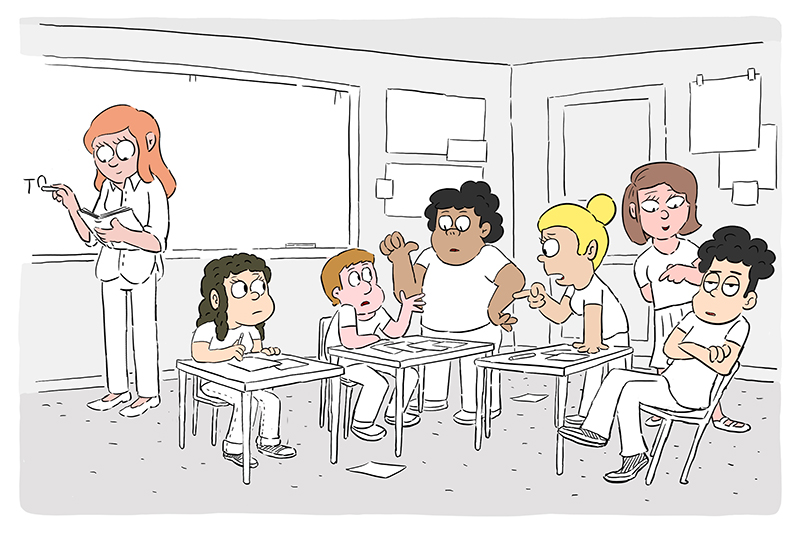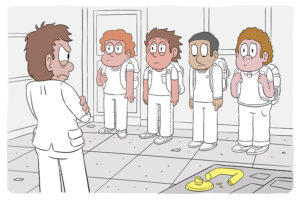
12-year-old Valeria attends a Dutch school for the first time. She is the only migrant in the class. The first month she received special attention from the teacher. Now the teacher asks if she will work with a small group of classmates to make a paper and presentation. Everyone is talking interchangeably and the teacher is not even paying attention! The teacher is unclear!
Another view
Valeria was excited about the assignment at first. “Fun!”, she thought, “What kind of animal does the teacher want us to make something pretty out of?” But she didn’t say that at all! The children in her group shouted interchangeably, “My dog!” says one, “No, my cat!” and another girl wants to do it over her beautiful pony. Valeria wants to ask the teacher, but she is busy with something else. She doesn’t dare stand up. “Why doesn’t she just tell us what to do?”, thinks Valeria. “Those kids think they know but they all say something different. I feel alone and I miss Luna, my sweet cat who is still in Venezuela. Why is the teacher so unclear?”
The teacher has every confidence in the children. They will work it out together. She is also proud of Valeria. “Those is already starting to come along well. Nice girl!” she thinks. “I’ve asked the class to do a piece of work and all the kids bring up an idea. Very nice to see. So I let them do their thing. But Valeria says nothing and seems absent-minded. Maybe in Venezuela they don’t have pets. ” She decides to leave it as it is, if Valeria has any questions she will hear.
What’s going on?
Valeria comes from a society that is more authoritarian than the Dutch one. As a result, people need much more clarity from the teacher, about the assignment and how to get a good grade. For Valeria is the teacher in charge who knows everything. She is used to getting explanations and hearing exactly what to do. But now she finds the teacher unclear. And with that, the teacher loses her respect.
In the Netherlands, teachers prefer that students take initiative, come to a solution together and contribute to a group task. Working together is often more important than the grade, and if there are questions, the teacher is available. It seems like the teacher is doing something else, but she is there to answer questions.
Where is the connection?
Valeria can still join the group and rely on the teacher to step in when needed.
At the same time, the teacher can take into account that the style of teaching she is used to in Holland, does not always meet the learning needs of students from another culture. Extra attention and clearer instructions will help Valeria learn to trust the teacher and eventually accept that the learning style in Holland is based on more group work and own initiative. It is important for her to watch the child’s body language. The latter may not raise a hand, but gives other signs such as looking at her briefly or shrugging her shoulders.
Valeria can then try to join the group and practice speaking her own mind. Also by raising her hand.
Explanation
In Holland, hierarchy is not important. Valeria comes from a hierarchical society. In her culture, a leader is expected to take care of his people in exchange for loyalty , or obedience.
In the Dutch school, Valeria sees an egalitarian culture where the teacher facilitates more than directs. Students are expected to take initiative and engage in discussion with each other and with the teacher. Every child is encouraged to have and express an opinion.
Awareness of and mutual respect for these differences help Valeria and the teacher move toward each other and so that learning needs and learning styles are increasingly aligned.
In short
For the teacher:
- Accept that the Valeria comes from hierarchical society and that the Miss has status and deserves respect.
- Valeria is not likely to show what she really thinks. Watch for other signs in her communication.
- Create an opportunity with Valeria and her parents to talk about her role as a teacher.
- In instruction, give some extra attention to the informal atmosphere of the assignment.
For the Valeria and her parents:
- Accept that Dutch has an egalitarian society.
- Accept that cooperation is often more important than order, quiet and good grades. The teacher is not unclear, she is letting the children learn to work together.
- Above all, ask your questions and express your surprise. The Dutch are used to being addressed directly.
Important to know:
This anecdote is based on stories shared with us. Connect2Us strives to highlight the dilemma from both sides and not to label people or suggest that one or the other should behave differently. We see in our daily intercultural work that awareness by those involved is enough to move toward each other without pretending to be very different. Connect2Us aims to help readers recognize and avoid prejudice. Read about prejudice, discrimination and racism here.

